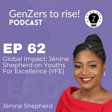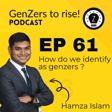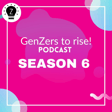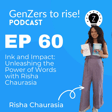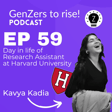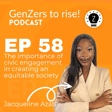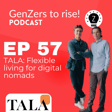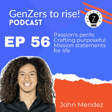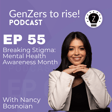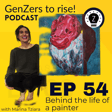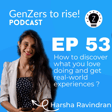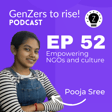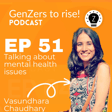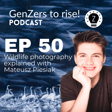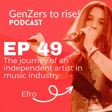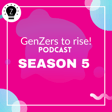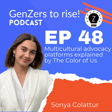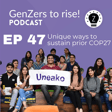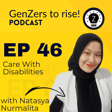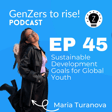Become a Creator today!Start creating today - Share your story with the world!
Start for free
00:00:00
00:00:01

Building a clean vegan skincare brand while in college with Jeena Chong
In this episode, we are talking to Jeena Chong. She is the creator of a vegan and clean beauty brand called city face. She has been featured on many major publications such as allure and pop sugar. On top of that she’s a college student! Learn how she gives back to NGOs, balances her life, and creates products!
Cityface social media: https://lnkfi.re/cityface
Follow ChangemakerZ at https://go.changemakerz.org/follow
Episode's link: https://podcast.changemakerz.org/jeena-chong
Produced by Vasilis Skarleas
Transcript
Introduction to Change Makersly and CitiFace
00:00:01
Speaker
Hello everyone, I'm Saloni. And I'm Hannah. We run Change Makersly, a student-run initiative that aims to empower, educate, and connect gender leaders interested in entrepreneurship. We interview teenagers with impactor projects and career resources to help you change the world. If they can do it, so can you.
00:00:23
Speaker
On this podcast, we discuss logistics of creating different types of projects with Gen Zers who have already done it. We will leave our social media and website information in the description.
00:00:40
Speaker
Hello, everyone. Welcome to another episode of Gen Zers to Rise. Today, we will be learning more about what it takes to run a skincare company with Gina Chong, the founder of CitiFace, a clean vegan beauty brand. On top of that, she's a student at UC Berkeley studying theater and business administration. Thank you so much for joining us today, Gina. We're so happy to have you here. Thank you for having me.
Motivation and Team Composition at CitiFace
00:01:05
Speaker
So what sparked the creation of this brand and what were your first steps when starting it?
00:01:10
Speaker
Yeah so I grew up in Korea actually and throughout high school I had the opportunity to work as a model and on these photo shoots you know a lot of other models were they were totally fine with using normal skincare products or different makeup products but for me I struggled a lot with sensitive skin so I couldn't really find products that were suitable for young skin that were really high quality and had clean ingredients so I knew it was something that I always wanted to do maybe in the future
00:01:40
Speaker
And after I started going to school in Berkeley because of the huge startup atmosphere, I decided it was just the time to start when the pandemic happened. So yeah. Well, that's awesome how you took your experience in modeling and turned it into whole brand. So you also built a team. How did you meet them and what are their roles?
00:02:01
Speaker
Yeah. So our whole team is made of current students in college or recent graduates. Um, that was like a very conscious effort of mine. I thought, you know, a brand started by Gen Z that's made for Gen Z. It should have a team of bully Gen Z. So we totally understand what our, um, our community and our consumers need. Right. Um, so yeah, um, different people are in charge of.
00:02:28
Speaker
marketing, the graphic design content that we have on our social media, web design, and PR as well. Wow, so that seems like a pretty big team so far. So at what point did you start to build the team? Was it right from the beginning?
00:02:44
Speaker
Yeah, actually, for the whole development process, which was about six, seven months, I would say, I was alone in the process, which was very difficult, you know, for anyone who is considering starting that company, I would definitely recommend trying to find a co-founder or creating a co-founding team, because that's something that I definitely regret.
00:03:10
Speaker
I had a few friends helping me in the development process, but they weren't like co-founders or anything. But once we launched, I also launched both in Korea and America. So it was definitely getting too hard for me to manage both. So that's when I started looking for some people and I just first reached out to people that I took classes with, reached out to my friends and it went from there. But now we have a team of about
00:03:38
Speaker
six people. Yeah. Wow, that's awesome.
Startup Funding and Donation Model
00:03:42
Speaker
So I feel like one of the biggest obstacles when starting a business is like financing it. So what are some different ways to fund a business? Do you recommend using savings or seeking outside investment? Yeah, I mean, there are two main ways that I would say you can get funding for a small company or a startup. The first is
00:04:04
Speaker
people call it bootstrapping. So that's basically just using your own savings, putting it into the company. But also I would also add
00:04:14
Speaker
you know, like reaching out to your friends or family members, like in class, in a startup class I took, they would always talk about your rich uncle. There is maybe some close family friend who can offer you a little bit of money in the beginning to help fund your business. So definitely something like that will be good. And I personally recommend definitely using your personal savings at first, because investors are not likely to invest in your company if you don't have a proven track record. So that leads to the second
00:04:44
Speaker
kind of option for funding, which is finding an investor or working with a VC or venture capital firm. But that's definitely once you've grown your brand a little bit and it's starting to have a consistent kind of revenue. That's when we're supposed to look for funding. Yeah.
00:05:02
Speaker
That's awesome. Yeah. My dad, he used to tell me like, um, Oh yeah. If you want to invest, it'd be like the three F's, the friends, family, and fools. So like kind of just using the people around you. Um, but yeah. And can you tell us more about your NGO partnership program? Like, how do you give back while still making a profit? Yeah. So I think our NGO program is kind of different compared to other,
00:05:29
Speaker
you know, donation models that people have or just corporations working for social good. Because a lot of what I kind of struggled with understanding with these companies is how much they were actually giving back to these NGOs or their partners, right? So we just make it super clear. It's definitely not anything incredible. But what we do is we donate $1 per product purchase to the specific
00:05:57
Speaker
city that correlates with that organization. So yeah, we just have a very transparent donation model. But in addition to financially supporting these NGOs, we do social media campaigns with them or we help promote their content with our kind of community that we formed of Gen Z and other skincare lovers. Yeah.
00:06:22
Speaker
All right. Yeah.
Skincare Knowledge and Product Development
00:06:25
Speaker
And skincare products require a lot of different ingredients and processes. What was the process of becoming familiar with something so complex? And why did you want to make sure that it was vegan? Yeah. The first part, I would say just getting
00:06:40
Speaker
to know more about skin care. It was definitely a gradual process. I'm really grateful that I had the opportunity in high school to work with different brands just through modeling, you know, just at least testing out the different products and trying to figure out what works for my skin and what doesn't. And I think that was probably the biggest thing. And as soon as I decided that I was actually going to create the startup, I just did a lot of research and
00:07:07
Speaker
learning and searching on Google basically into different types of ingredients, what actually made a product good, what didn't, why some products weren't working for my skin and why some were, made a list of a lot of different ingredients, wrote them down. Yeah, just a lot of research. And I think Google is honestly your best friend in these kinds of processes. Yeah. And then by the end of the five, six months, I had gone over probably a thousand different types of ingredients and formulations.
00:07:37
Speaker
So yeah, I think it was definitely a gradual process. And then why I wanted to make my products vegan were, I mean, definitely my love for animals and I'm very against, you know, anything like animal cruelty. But I also think it's not too difficult to create products that are vegan and cruelty free. I think it only takes like a tiny bit of more effort, maybe a little bit more money.
00:08:04
Speaker
But I think the results are definitely worth it. So I would highly recommend everyone to do that. So we're going to have a little break, and we will come back to you shortly. Yes. And that's one thing I love is that nowadays, you can just Google it. You don't have to do an expensive class. There's a lot of free material out there. That's one of my favorite things. For sure, yeah.
00:08:31
Speaker
Yeah, definitely. I feel like the overall idea of starting a business is super overwhelming, especially to young people. So can you walk us through the creation of a product from ideation to launching it on your website? Yes, I'll try my best, but it is definitely complex. And I think for me,
00:08:52
Speaker
what I learned with you know startups and everything is it's definitely something that you just have to do even if you take a class or you follow the textbook kind of guideline for how you start a company it'll never kind of be that conventional way so just I think the basics were in the beginning the development stage so this is where you
00:09:17
Speaker
try to find a way to differentiate your company and find an actual problem in the market that you want to solve. And for me, that was looking more into the skincare market, identifying why exactly some consumers like me weren't satisfied in trying to find a solution to solve that issue. And that's the core of the whole process. And then I would say,
00:09:41
Speaker
It would be the branding and design process. So once you have the main reason you're starting the company, now you want to give it an identity. So I worked with my friend who's studying creative direction at her school.
00:09:58
Speaker
And we created like a branding kind of concept for the company, a logo, chose some colors for the brand. And that definitely gave us a bit more focus and purpose for everything that we were doing afterward.
00:10:12
Speaker
And the design process is something that continued until the end, obviously with the packaging. So it started at that time. And then at the same time, we also started looking for manufacturers to work with for our products. So I had a lot of different meetings with multiple skincare manufacturer companies, labs in Korea, and we started sampling the products. So for each product, I think there were about
00:10:41
Speaker
40 to 60 samples. And the samples are basically kind of trial products that we create. I talk and work with a lab to let them know what I want, the specific ingredients that I want, the texture, the feel, whatever. And then we get these samples and I test them for weeks and see which one is the best. And then that's our final product. And once we have the final product, we
00:11:06
Speaker
Also work on the packaging selection. That was a big thing for me. I care a lot about sustainability, but because of my limited funds at that point and the quantity that I was able to create, I wasn't able to create everything in the most sustainable manner, but I still try to find the options that were the most sustainable out of the things that were, you know, like available for me, right? So we did that.
00:11:36
Speaker
And then I think by that time we were also working on website. The thing is I think everything kind of converges together at one point. And once you're maybe five months in, it's kind of crazy and you're just doing so many things at once, right? You're checking on your supplies, seeing if everything is production, checking if the boxes are being made, if the formulas are, you know, high quality and everything's up to the standards.
00:12:04
Speaker
And then at that time we designed our website and then I think we somehow launched it. Yeah. Yeah. I just want to say like your packaging is stunning. Like I love the, like
Packaging and Marketing Strategies for Gen Z
00:12:17
Speaker
the line work design seriously. And then I love like the cities as the, it's beautiful. So thank you so much. Yeah. Can I actually just talk about that for a second? Um, that packaging,
00:12:30
Speaker
was I think our fifth iteration of our packaging design. So we had something completely different in the beginning that we were literally going with until I think two weeks before the launch. And we were like,
00:12:44
Speaker
Okay, my thing with packaging is, if I look at it every day, I better still enjoy and be somehow interested in it, right? But the first design, by the end of the second week, I was like, I don't want to look at it anymore. So I was like, we have to change it. We have to push back the launch date and just change it. So that's what we did. And I'm very grateful you say that. Yes, I love it. It's so young and fresh. And it's just a great packaging. Thank you.
00:13:12
Speaker
Well, I doesn't say you guys had to like go through so many iterations, but on top of that, you're also like manufacturing products in Korea and also launching in Korea. So what's that experience like? And are there any like differences between selling products in the US and differences between selling it in Korea? Yes, I would say the Korean, the average Korean senior consumer is much more aware and just
00:13:39
Speaker
a lot more well-versed in skincare and different types of ingredients. So I think they're a little bit more picky. We don't have to explain things as much. And they understand that our products are really high quality and why they should basically look into them. But in the US, I think more recently, definitely clean beauty and high quality ingredients, that's definitely becoming a bigger trend. But still for the Gen Z generation and younger generation, I think a lot of us are still drawn to
00:14:09
Speaker
aesthetic skincare, you know, the thing that looks the prettiest on our cabinet, but sometimes those things don't have the best ingredients. So we're really trying to have a balance between still trying to grab the attention of Gen Z who are really drawn to graphics and exciting kind of product design, but also trying to educate them on what's actually important for their skin. Yeah, like
00:14:33
Speaker
you definitely eat with your eyes first or whatever. So that I've been, I've been a victim of that. And then I started watching skincare by Hyram and I started learning a little bit more and now I just use CeraVe. So, but you kind of touched on this. Like you, your target audience is Gen Z just like us. And how are you making sure that people know that your brand is Gen Z and how do you try to target Gen Z specifically? Yeah, I think,
00:15:03
Speaker
In the beginning we were more forward with our whole kind of mission for the brand that it's like buy Gen Z for Gen Z But now I think it's more of an organic process just because we are Gen Z and the content we like and we create are the things that appeal to Gen Z and I think definitely the
00:15:26
Speaker
some of the press attention that we've started gaining recently, which is really incredible for us, because we're such a small student-founded company. I think that's definitely been helping us too, because they really like the fact that we are for Gen Z by Gen Z. Yeah. What are some of your goals for CityFace? What are some of your goals for after graduating college? Ooh, the hard questions. Right? Yeah.
00:15:56
Speaker
For City Face, I mean, I have a lot of goals, but I think definitely just to get people to know our brand more, you know, it's only been about six months since we've launched. We launched late December of 2020. So yeah, just to get people to notice and engage with the brand first, I think that's a big goal that we're working on.
00:16:26
Speaker
And then the next step would probably be to work with a retailer or enter into, you know, a distributor that you guys might know of. So we're definitely working on that and I hope it somehow works out. And for some personal goals, I am a rising junior right now at UC Berkeley, but I'm actually, I decided to graduate a year early. Um, so.
00:16:53
Speaker
graduation is definitely creeping up on me and it's girl boss. Oh my gosh, no, but thank
Future Goals and Personal Interests
00:17:00
Speaker
you. But I think, I don't know, definitely just to continue growing my company, moving forward with it, you know, giving something valuable to the Gen Z community. And definitely I'm also interested in the arts. Like that's a big passion of mine. So I'm also pursuing acting.
00:17:22
Speaker
And hopefully, you know, it'll work out too. Broadway on the weekends and then City Face and the... Yeah, they're in the weekends. Sounds good to me.
00:17:35
Speaker
Wow, that's incredible. You guys have only been here for six months and you've already been featured on so many major publications such as Allure, PopSugar, The Zoe Report, and you recently chatted with Hollywood Access on NBC, which is incredible. So what advice do you have for people looking to get their brands featured on these platforms? Yeah.
00:17:57
Speaker
I definitely think a lot of these features were organic. It wasn't for press. You can either do paid media or it can be organic. They can reach out to you. All of ours were organic. So I would say just in the beginning, in the brand development process, if you really are solving an issue that hasn't been solved and
00:18:22
Speaker
you have something unique that only you as a founder or as a company can bring to the world, then I think people will respond to that and resonate with that. Yeah, for sure. It's like that quote, be so good, they can't ignore you. Like the ones you see in those hustle culture Instagram pages. Oh, yeah. Yeah.
Time Management and College Resources
00:18:46
Speaker
So you're also a college student. And like you said, you also have a big passion for the arts.
00:18:52
Speaker
And so what are some of these other hobbies and how do you manage your time while going to such an academically rigorous school? Ooh, that is a question I ask myself every day. It's definitely hard. And, you know, in actually in the development process of City Face, I was a full time student. So I think what happened was I didn't sleep. And I do not recommend that for anyone because I literally after I launched my brand, I took a break.
00:19:23
Speaker
for about a month and a half. Like literally I didn't talk to anyone. All I did was watch Netflix. And I don't know if that's the most efficient way to do things. So now what I'm working on is definitely setting boundaries for myself, knowing what I need to be able to be the most creative and efficient. And I think for me, that's,
00:19:50
Speaker
Having specific hours where I let myself work, cutting myself off at that time, and then literally scheduling in sometimes the things that I'm passionate about, which is, you know, like singing or acting, I would schedule in times in my calendar.
00:20:07
Speaker
because especially going to such a intense school, like you said, sometimes if you don't work on those like self-care moments or even just like times to hang out with your friends, it just won't happen. So yeah, I'm definitely still managing it, but it's gotten better.
00:20:24
Speaker
I'm so happy you said that too, because it's like work hard, sleep when you're dead, all that. But it is important to focus on your goals. Yeah. And maybe too it helped when you started getting a team, because I know you mentioned you did it all by yourself at the beginning. So that probably...
00:20:41
Speaker
Exactly. I think the biggest lesson I learned throughout the whole process was ask for help, reach out to people, right? Because even for the team, like I reached out to people for help and they're like, oh, okay, I want to join your team. Even if it's a small thing, now I always ask people first and ask for help and
00:21:02
Speaker
Most people are willing to help you and if they don't want to help you, you know, like move on. There are definitely more people who can probably work with you and help you and you can also help as well. So yeah. So true. Nothing wrong with asking for help and it is important to schedule yourself. We're talking about skincare. Scheduling yourself care, it's required. Are there any advantages to being an entrepreneur in college? Were there any clubs, connections or resources at Berkeley that helped you with your business?
00:21:31
Speaker
Oh, I think definitely. I think first, the reason why I started the brand and the kind of the spark was the group of friends that I had in my business club. They were all actually, it's not a business. It's like a consulting organization, but we focus on startups. So they were all really passionate about entrepreneurship in the beginning. And once I told them my idea, they supported me a hundred percent. That was definitely something that I needed. So having that kind of.
00:22:02
Speaker
connected passion, shared passion for one thing was super helpful. And also the professors that I met through my business and entrepreneurship classes, one of them is actually the founder of Guitar Hero. I don't know if you guys know the game, but I'm a huge fan.
00:22:20
Speaker
just a small little game. Right. Exactly. I was like, Oh my gosh, I can I can meet this professor and actually learn from him. But now he's like a mentor of mine. Like I we were just emailing yesterday about one of my features and he has been incredible in the process. So definitely like, you know, professors, incredible people at your school. They were incredible for me. And what else?
00:22:48
Speaker
I think also just being surrounded by really motivated and high achieving individuals, it can hinder, but it can also help you, right? And I think at the point of when I was developing my skincare brand, it was definitely helping me because I was like, if other people can do it, I can also probably do it.
00:23:10
Speaker
Yes. And it's like it's so easy to you want to compete, but don't like compare and compete. Just be like, I'm surrounded by these people. I want to learn from them because you don't you want to be in the room with people who are better than you so you can learn. You don't want to be the best one in the room. Yeah, definitely. I think competing is kind of the wrong mindset. It's more like what else can I bring to the world? Right? Like what else can I hide? Yeah.
00:23:37
Speaker
So thank you so much for today's episode. We learned so much about starting a skincare business, and it was an honor having Gina Chong with us today. Thank you very much for listening. If you liked this episode, go and listen to our previous episodes with amazing entrepreneurs, YouTubers, and changemakers. Until next time, keep changing the world.
00:24:02
Speaker
We hope you guys enjoyed our conversation. We had such a great time. Make sure you leave us a review. You can also follow us on Instagram at changemaker.c to keep up with all of our new content. We also have a Facebook page called changemakersc, but you'll need to look down because I honestly don't even know how Facebook works.
